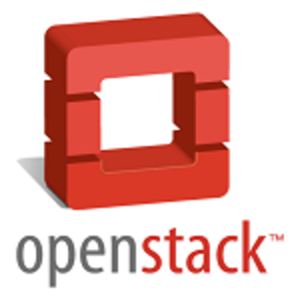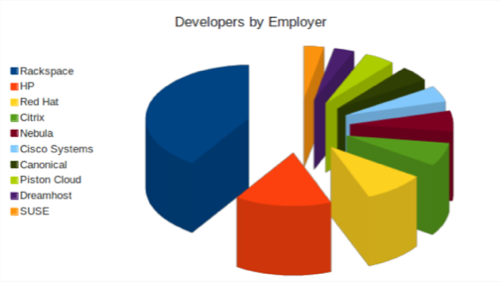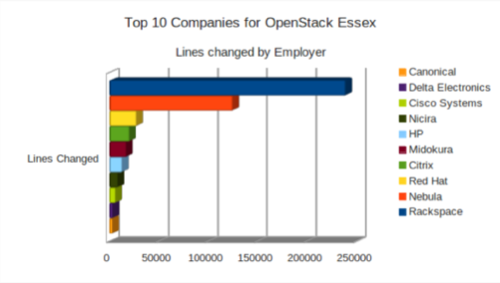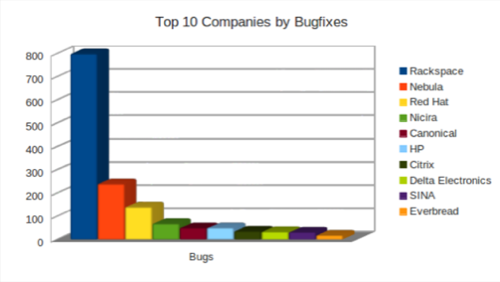It’s always interesting to see who really contributes to open source projects. That’s doubly true when it comes to projects that are corporate-driven, because they provide a lot of insight into which companies are driving a project and have a stake in supporting it. Looking at the numbers for OpenStack’s Essex release, it’s clear that only a small subset of companies involved in OpenStack are driving development.

Mark McLoughlin, an OpenStack contributor and Red Hat employee, took the time to come up with stats culled from the commits and Gerrit code reviews for Essex.
McLoughlin provides several different pieces of the puzzle when looking at the OpenStack picture. He’s looked at the developers who’ve had the most change sets for the release cycle, the most changed lines, and the most lines removed. He’s also looked at lines reviewed, as well as the number of developers by employer.
It’s not a perfect picture, of course. Having the most changes doesn’t mean that the changes were important, for instance. It does give a clearer picture of what’s really going on in OpenStack development.
Developers by Employer
The first figure to consider is the number of developers contributing by company. No one should be shocked to see that Rackspace leads by a wide margin with 51 employees. To put that in perspective, Rackspace’s Stefano Maffulli identified more than 200 people and 50 companies that contributed to OpenStack in the Essex development cycle. McLoughlin’s figures say 226 developers.

This means that more than a fifth of the contributors to OpenStack are on Rackspace’s payroll.
HP has made a big public commitment to OpenStack, and it seems to be living up to it. HP has 19 people identified as contributors to OpenStack Essex.
We told you that Red Hat was contributing heavily to OpenStack in February. But at that time it wasn’t entirely clear where Red Hat fell. Turns out, it’s third in developers, with 12 developers contributing.
After Red Hat, there’s Citrix (9), Nebula (8), Cisco Systems (6), Canonical (6), Piston Cloud (6), Dreamhost (4) and SUSE (4) in the top 10.
The number of bodies, though, can be misleading. It may be that HP and Red Hat developers are not exclusively tasked with OpenStack, though. Some of Red Hat’s developers, for instance, are also doing work packaging OpenStack for Fedora and/or working on OpenShift. A company might only have two employees doing OpenStack work, but they may be doing it full time and/or doing some of the most difficult work.
Code Influence
To get a clearer picture than we have just by looking at developers, we can also see what companies are responsible for the most code changes and code reviews.
OpenStack uses Gerrit for code review, so it’s possible to see who’s reviewing and approving code. Rackspace dominates here, with 68.1% of reviews. Nebula is next with 12.6% of the reviews, Red Hat has 4.4%, HP has 3.7% and Nicira has 2.4%. When you get to the bottom of the top 10 (Piston Cloud, Canonical) you’re looking at less than 1%.

In terms of lines changed by employer, Rackspace is at the top with 46.8%. Nebula has 24.4%, Red Hat has 5.4% and Citrix has 4.0%. Midokura, a company I hadn’t heard of until doing this piece, is in fifth place. Despite Dell’s vocal support for OpenStack, the company doesn’t seem to be contributing a great deal.
Change sets are a slightly different story. Rackspace still dominates, with 55.2%. Nebula has 10%, Red Hat has 7.9%, HP has 2.9% and Canonical has 2.6%.
Another view we have is bugfixes, out of the Launchpad statistics. Again, Rackspace is at the top with 800, Nebula comes in with 240, Red Hat has 140, Nicira has 69 and Canonical has 50.

In every case, the drop-off after the first five or ten companies is very significant. For example, in terms of lines changed – Canonical is the 11th company by lines changed and only claims 0.6% of changes.
What It Means
Despite the effort to paint OpenStack as a widely supported project with lots of developer commitment, it’s still Rackspace that’s doing the lion’s share of the work.
Nebula is also pulling a lot of weight in the project, though it has fewer contributors than HP or Red Hat. The top 10 corporate contributors are pulling a disproportionate share of the load in OpenStack.
This isn’t abnormal for an open source project, though. If you look at Linux kernel development, you’ll see that the top contributors are doing more than the long tail of companies that are involved in kernel development.
But the disparity is striking. No company is shouldering nearly 50% of kernel development by any measure.
Looking at recent kernel development, you’ll see Red Hat at the top of companies contributing to the kernel. But Red Hat sits at the top of the list (after developers with no corporate affiliation), with 10.7% of the changes from the 2.6.36 kernel to the 3.2 kernel. Intel has 7.2%, Novell 4.3%, IBM 3.7% and so on – down to a long list of companies contributing tiny bits.
The real contributor community outside of Rackspace doing significant development is smaller than one might think given the figures coming out of OpenStack. It looks like it’s on its way to a healthy mix, but I’m not sure it’s quite there yet.










